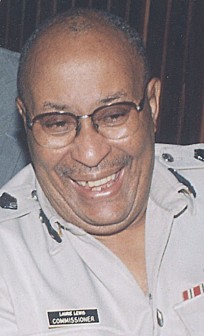Co-leader of the Working People’s Alliance (WPA) Dr. Rupert Roopnaraine says it comes as no surprise that former police commissioner Laurie Lewis paved the way for Gregory Smith, the main suspect in the 1980 death of Dr Walter Rodney, to obtain a Guyana passport years after.
Roopnaraine also says the evidence from the most recent session of the Walter Rodney Commission of Inquiry (CoI), which implicated the now deceased Lewis in the manipulation of the standing procedures to ensure that Smith received a passport, confirms that the State was willing to do anything necessary to protect him.
Police Sergeant Alexis Adams, who is attached to the Records Department of the Central Immigration and Passport Office, testified that records indicate that the usual procedures as it relates to the issuance of a passport to Smith were not followed.

Roopnaraine, told of the testimony, said it wouldn’t be a surprise that arms of the State were bending over backwards to hide and protect Smith.
When the passport would have been provided to Smith in 1999, there would have already have been discussions here by the government and the WPA to have Smith face a murder charge and for him to be extradited.
Dr. Rodney, a renowned academic and political activist, died in a car near John and Bent streets on June 13, 1980, after what he thought was a walkie-talkie, given to him by the now deceased Smith who was a Guyana Defence Force member, exploded. The former People’s National Congress (PNC)-led administration, then headed by late president Linden Forbes Burnham, has long been blamed for the murder. The PNCR has, however, continuously denied any responsibility.
Based on Adams’ testimony, the records suggest a linkage between the deceased Lewis, a former senior intelligence figure in the PNC administration, and a conspiracy to spirit Smith out of the country after Rodney’s killing.
Smith eventually ended up in Cayenne, French Guiana, where he died in December of 2002 from cancer.
Adams testified that acting on instruction from her superiors, she had successfully gone through records in search of passport application forms in favour of William “Gregory” Smith, whose date of birth was given as June 5, 1946. She was also required to look for an application form in favour of Cyril Milton Johnson, which was an alias Smith used after he fled Guyana.
Under cross-examination by counsel for the commission Glenn Hanoman, Adams said she had seen the letters “CoP,” indicating who sent the form in favour of Smith for the application to be processed.
She explained that these letters were an acronym for “Commissioner of Police” and that recorded at those letters was the name Laurie Lewis.
At the time of Dr. Rodney’s death, Lewis was among the leading ranks in the Guyana Police Force and in August 1990 he was appointed to the highest office within the force and he served through until 2001.
Asked whether she had seen from the document that there was no signature where Smith should have signed and that there was no guarantor recorded on the form, Adams answered in the affirmative. She subsequently acknowledged that such omissions defied passport application procedures.
Asked by Hanoman whether it was possible that the reason the passport was issued to Smith, even though procedures were not followed, was because the application was coming from the Commissioner of Police, the witness answered in the affirmative. It was also noted that the Commissioner of Police is the Chief Immigration Officer and that forms passing through him have to be expedited.
Stabroek News made several unsuccessful attempts to elicit a reaction from the PNCR lead attorney Basil Williams, who was absent when Adams testified.





